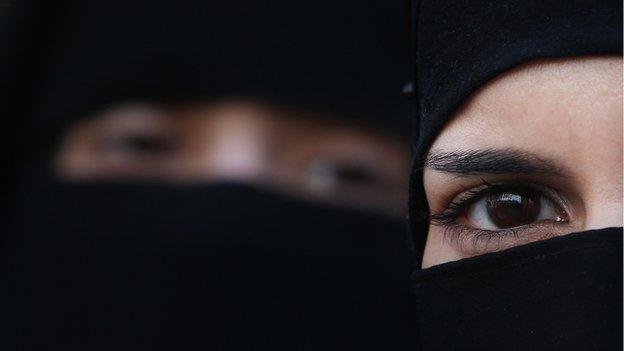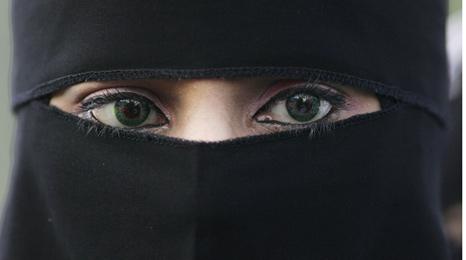Women in face veils detained as France enforces ban
- Published
The BBC's Hugh Schofield said Kenza Drider's protest successfully captured public attention and registered an objection to the law
At least two women have been briefly detained in France while wearing Islamic veils, after a law banning the garment in public came into force.
Police said they were held not because of their veils but for joining an unauthorised protest, and they were later released.
France is the first country in Europe to publicly ban a form of dress some Muslims regard as a religious duty.
Offenders face a fine of 150 euros (£133; $217) and a citizenship course.
People forcing women to wear the veil face a much larger fine and a prison sentence of up to two years.
The two women detained had taken part in a demonstration outside Notre Dame cathedral in Paris. Police said the protest had not been authorised and so people were asked to move on. When they did not, they were arrested.
One of the women, Kenza Drider, had arrived in Paris from the southern city of Avignon, boarding a train wearing a niqab, and unchallenged by police.
"We were held for three and a half hours at the police station while the prosecutors decided what to do," she told AFP news agency.
"Three and a half hours later they told us: 'It's fine, you can go'."
Under the law, any woman - French or foreign - walking on the street or in a park in France and wearing a face-concealing veil such as the niqab or burka can be stopped by police and given a fine.
It is a small fine, but symbolically this is a huge change, says the BBC's Hugh Schofield in Paris.
Guidelines issued to police say they should not ask women to remove their veils in the street, but should escort them to a police station where they would be asked to uncover their faces for identification.
The French government says the face-covering veil undermines the basic standards required for living in a shared society and also relegates its wearers to an inferior status incompatible with French notions of equality.
The ban on face coverings - which does not explicitly mention Islamic veils, but exempts various other forms - has angered some Muslims and libertarians.
A French Muslim property dealer, Rachid Nekkaz, said he was creating a fund to pay women's fines, and encouraged "all free women who so wish to wear the veil in the street and engage in civil disobedience".
Mr Nekkaz said he and "a female friend wearing the niqab" were arrested at a separate demonstration in front of President Nicolas Sarkozy's Elysee Palace.
"We wanted to be fined for wearing the niqab, but the police didn't want to issue a fine," he told AFP.
But opposition protests by Islamists and libertarians are unlikely to make much of an impression, our correspondent says.
What is more open to question, he says, is whether an out-and-out legal ban is necessary when, on most estimates, only 2,000-or-so women in France actually wear the niqab or burka.
Critics of French President Nicolas Sarkozy say it suits him to play up the Muslim question because he is an unpopular president in need of an easy vote-winner.
- Published11 April 2011
- Published31 May 2018

- Published11 April 2011

- Published6 September 2010
- Published21 January 2011
- Published6 April 2011
- Published6 July 2010